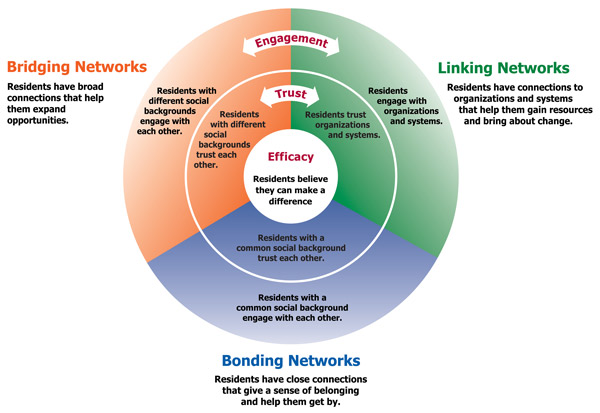A little trust goes a long way. In fact, scholars link trust in communities to successes such as stronger volunteerism, healthier residents, and economic prosperity.1
That means building trust in communities is worth some time and consideration. David Halpern and Robert Putnam have been looking at trust across countries, and give countries like the United States and the United Kingdom a middling grade when it comes to trust. In countries like Brazil, less than 10 percent of people say others can be trusted. In countries like Norway, more like 70 percent say others can be trusted. The United States lies in the 30–40 percent range.2
Of course, every community lies somewhere along that continuum. Where do you think your community lies? Before you answer, consider this: People and organizations in your community might be doing well in some areas of trust, but poorly in others. And you might want to cut your community some slack. Change can make building trust more difficult, requiring community members and leaders alike to give a little more time and effort to building trust.
Building trust four ways
"Trust can be looked at four ways,"3 says Eriks Dunens, a former Extension leadership and civic engagement educator who has studied scholarship about how trust happens. "When community members and leaders ask themselves whether they are trustworthy in each of these ways, they can make changes that matter."
-
Contractual trust refers, simply, to whether promises are kept, expectations are clear, and community members believe that they can depend on one another. Contractual trust is strong when people follow through on commitments; when they do what they say they're going to do.
-
Communication trust is more nuanced. "Community members need to know they'll be told what they need to know when they need to know it," says Dunens. "Clear and frequent communication helps people follow rules, support local causes, and accept change."
But keeping a tight lip can build trust, too. Dunens has firsthand experience in building trust as a board member for his neighborhood association. "In that position, I sometimes come across information about my neighbors. By only sharing that information with other board members when absolutely needed, I earn my neighbors' trust. Gossip erodes trust very quickly."
-
Competency trust is something even the most scrupulous communicator can lose if they don't perform their job well. "Competency trust is built when people are knowledgeable and skilled in what they do," says Dunens. "This is especially important in communities because running a town or city requires knowledge about everything from financing to street repair. People and groups build trust not just when they do a job, but when they prove they can do their job well."
Trust in competence can be strengthened in other ways, too – like admitting a mistake or expressing trust in others' abilities. "Trust is reciprocal," explains Dunens. "It's helpful to trust others' competence, to praise them for their skills, to consult them, and even to help them learn something they don't know how to do right now."
-
Caring is the softer side of trust. We strengthen caring trust with genuine acts and words that express concern. Caring trust leads others to believe that no matter what might go wrong, you intend to act in their best interests rather than from a personal motive.
Is your community building trust?
Simple actions like these build trust four ways.
Contractual Trust
- Publish updates about important projects in local newspapers, community portals or social media.
- Offer help as new neighbors move to town. Follow through if they ask for help.
Communication Trust
- Clearly communicate new or changed laws so that no one unknowingly breaks them.
- Carry on respectful meetings even when an issue creates conflict.
- Seek out a variety of ideas before making decisions.
Competence Trust
- Hire qualified people and recruit new volunteers with valuable experiences.
- Get training and resources for leaders and volunteers.
- Provide mentors to younger or less experienced people.
Caring Trust
- Create and maintain a welcome wagon.
- Create a local sports team that welcomes the entire community. Repeated interactions help to sustain trust.
Trust in the age of new diversity
"There are natural and ingrained reasons people have trouble trusting those who are different than them."
If America's levels of trust are changing, it might be because of new types of diversity in communities. Scholars like Putnam have observed over and over that diversity – racial, ethnic, religious and more – make trust more elusive. Dunens agrees. "We live in a world where we can't be homogenous anymore – nor should we be if we want our workforce and communities to grow," says Dunens. "So building trust with those from other cultures is an investment in the future."
Dawn Newman, who has worked on leadership and civic engagement issues in Minnesota's tribal communities, is realistic about human nature when it comes to trust and diversity. "There are natural and ingrained reasons people have trouble trusting those who are different than them," she says. "The only way to grow trust is to take the time needed to understand differences and find commonalities. It seems counter-intuitive to take that time when things need to get done – and things always need to get done. In the long run, though, that time can make community networks tighter and more productive."
Taking time to build trust
"First, trust is reciprocal. Someone needs to show trust before they get it back. And second, it increases step by step. It is rare for someone to jump in and trust quickly."
Dunens and Newman emphasize that, above all, trust happens within relationships. "Two things are generally true," says Newman. "First, trust is reciprocal. Someone needs to show trust before they get it back. And second, it increases step by step. It is rare for someone to jump in and trust quickly." Newman and Dunens suggest these ways community members can build relationships.
-
Exhibit humility and vulnerability. You may know a lot about your community, but you probably don't know everything. Check in about what diverse groups in your community need; acknowledge that they have valuable information and make contributions.
-
Ask questions with genuine curiosity. Everyone has a story to tell. Hearing others' stories helps everyone understand how their experiences shape them, and how regrettable past incidents might make it tougher for them to trust now.
-
Take time. Host a dinner; schedule a meeting; carry on a conversation on Main Street. Take time to be a welcoming presence.
-
Share information that helps newcomers be successful in your community. For example, let them know when they need to move their car to accommodate winter snow plows; make information about an upcoming event available in more than one language. As noted earlier, communication builds trust.
-
Gather input intentionally from all groups. This may require outreach to specific community members, including youth, or it may require you to ask bi-lingual leaders to join your effort.
Why build trust?
Given our busy lives, why take time to build trust? The most practical reason is that building trust gets things done. Putnam and other scholars who've examined effective communities have seen that. (This research is summarized by a team of Extension educators and specialists in the Social Capital Model seen below)
Community Social Capital
Trust creates bonds between neighbors and friends that they turn to when they need help. Bridges between groups with different social backgrounds limit conflict and leverage new opportunities. Trust between communities and organizations or systems create links to important resources that help communities get where they want to go.
"The bottom line is that trust makes communities more effective," says Newman. "Isn't that worth the effort?"
Recommended Resources
-
This November, 2016 Freakonomics Radio podcast focused on trust in society, including some interview segments with Robert Putnam.
-
Trust is built when citizens are engaged in decisions. Find Extension resources to support engaging citizens.
-
Want to know how Latino community members feel about becoming part of local leadership? Read creating pathways for leadership among Latino community members.
Eriks Dunens and Dawn Newman, former Extension educators
References
1The Saguaro Seminar. (2001). BetterTogether (Final Report). Cambridge, MA: Harvard Kennedy School.
2Halpern, D. (2015, November 12). Social trust is one of the most important measures that most people have never heard of – and it's moving.
3Reina, D. S., & Reina, M. L. (2007). Building sustainable trust. OD Practitioner, 39(1), 36; and Arnstein, S. R. (1969). A ladder of citizen participation. Journal of the American Institute of Planners, 35(4), 216-224.
Reviewed in 2022



